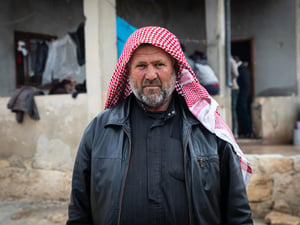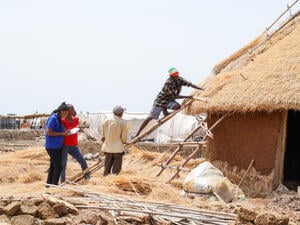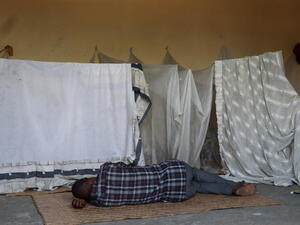Fleeing Iraqis desperately need shelter
Fleeing Iraqis desperately need shelter

An older woman with two children in a tent at the Khazair checkpoint. They have no money and nowhere to go after fleeing Mosul. The government and UNHCR are providing them with shelter, hygiene kits and other basic supplies.
ERBIL, Iraq, June 13 (UNHCR) - The UN refugee agency on Friday reported that a shortage of shelter is emerging as a key challenge for many of the hundreds of thousands of Iraqis who have fled this week's violence in the northern city of Mosul to seek shelter in Iraq's Kurdistan region.
Local authorities say 300,000 people have sought safety in the Erbil and Duhok governorates and UNHCR monitoring teams report that many arrived with little more than the clothes they were wearing. Many people have no money, and nowhere to go. While some stay with relatives, others are temporarily in hotels where they are exhausting what funds they have. Many families in Duhok are also sheltering in schools, mosques, churches and unfinished buildings.
A growing number of people are now staying in a hastily set-up transit camp near the Khazair checkpoint, some 40 kilometres from Mosul, UNHCR spokesman Adrian Edwards said in Geneva.
"Over the past two days, UNHCR has helped the government pitch tents there, and is providing plastic sheets, hygiene kits and other relief items to the displaced. The host communities are providing hot meals and other food. Sister UN agencies are installing latrines and water tanks, and providing other relief items," Edwards said.
Tayba, a widow from Mosul, arrived at Khazair on Wednesday with three of her five children, including 11-year-old daughter Asmaa, who lives with disability. "There was a lot of bombing [in Mosul], the situation was very bad. Bullets were flying into our backyard. My neighbour was shot in the head," she told UNHCR, adding that there was no electricity or food. They decided to flee.
"We got to the checkpoint by walking and getting rides with people who were going to Erbil," the 48-year-old explained. She has no money and no idea where to go next, but has found a place to stay at a transit centre established at the Khazair checkpoint between Ninewa and Erbil governorates.
Tayba is grateful for the help she is receiving, including a tent, but says Asmaa needs extra help. "We need a wheelchair for my daughter and we need a place where we can wash and stay clean," she said.
UNHCR has also delivered close to 1,000 family tents to a new camp being built by authorities and NGOs at Garmawa, near Duhok in the Kurdistan region.
"Teams started raising tents yesterday, and we expect the camp will initially host some 3,000 people. Planning is under way for two more sites in Minara, south of the Bedrike checkpoint and Zummar, near Sehela, in case they are needed," Edwards said.
This weekend, UNHCR protection teams will be gathering more information on where other displaced people are staying, and how the refugee agency can best meet their needs. The protection staff are also identifying the most vulnerable among the displaced, such as older people, those living with disability, children and pregnant women, and reaching out to other humanitarian groups to provide immediate emergency support.
UNHCR's Edwards said that while the rate of new arrivals to the Kurdistan region had slowed over the last day or so, the situation remains fluid with fighting continuing on several fronts and further displacement could take place. Other displaced people are spread out beyond the Kurdistan region with some going to Baghdad and elsewhere, while others have remained in Ninewa.
"Our monitoring teams at checkpoints observe that some Mosul families are returning after hearing that water and electricity services have been restored. Others say they are returning because they ran out of money, and prefer to return home than stay in mosques, empty buildings or other collective shelters," Edwards noted. With the sudden mass movement of people, there are enormous new needs.








